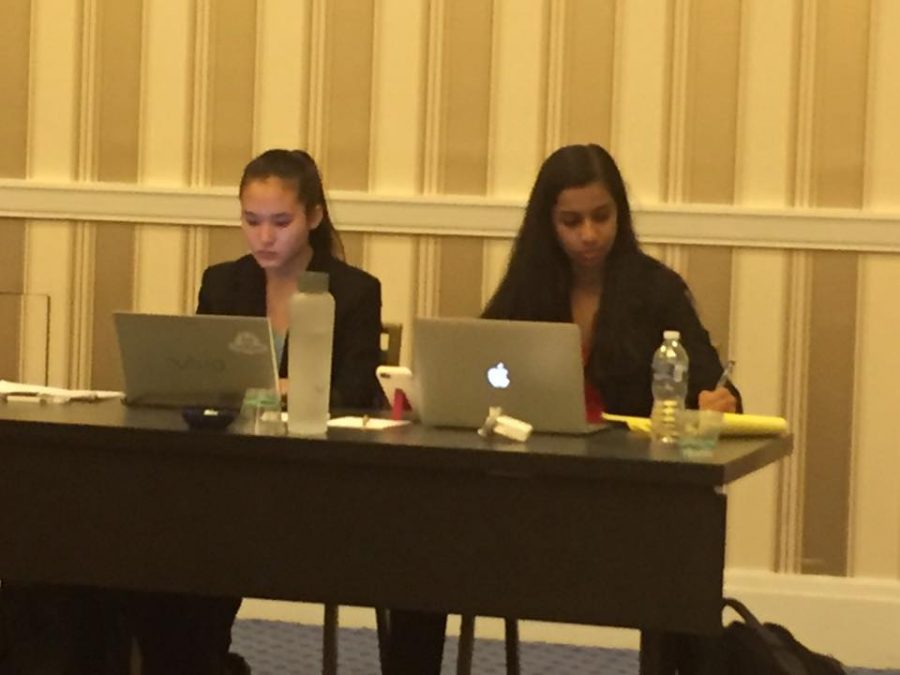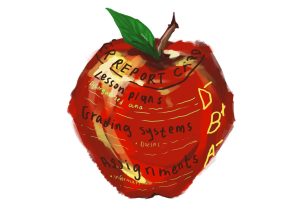Public Forum debate pair Maddie Min and Meghana Boojala advance to finals in national tournament
Photo courtesy of Meghana Boojala.
Boojala and Min review their research during the semifinal round of the Capitol Classic tournament on Oct. 24.
November 2, 2016
Juniors Maddie Min and Meghana Boojala have compiled research, composed arguments and competed in Public Forum (PF) debate together at Jefferson since they decided to join on a whim during summer World History I. After working as a pair for more than two years, they advanced to the tenth, final round in a national tournament for their first time ever at the Capitol Classic tournament on Oct. 24, also securing their first Tournament of Champions (TOC) bid. Riding on this success, they’ve determined their goal for this year: participating in the most competitive national PF tournament.
“We want to work towards getting another TOC bid because you need two to go to the gold tournament,” Boojala said.
Min and Boojala improved by evaluating and addressing errors they had made in an earlier national tournament this fall where they were eliminated before “breaking,” or advancing into elimination rounds.
“Maddie and I went to Wake Forest and we actually didn’t do that well,” Boojala said. “We did not break—we had an okay record, but after that, we reassessed our situation. We rewrote one of our con cases; we kind of strengthened our rebuttals. When we walked into Capitol Classic, we really worked towards reorganizing the way we argued the topic.”
PF tournaments during this Sep. and Oct. explored probable cause in schools. When arguing the pro side, teams argued for a higher standard of evidence in school discipline systems; the con side argued that administrators need the ability to investigate students without authorization or extensive warrants.
“You have to be able to argue both sides and switch into that mindset really quickly,” Boojala said.
Though this subject affects high school debaters, Boojala explained that she keeps her opinions separate from debate arguments.
“Whenever I get a debate topic, I try my best not to think about anything other than the research I have. You can’t say anything without having the evidence or logic to back it up. We kind of need to avoid having any personal bias.”
After winning a certain number of rounds in the tournament, Min and Boojala advanced to power pairing rounds, when a pair debates against a pair of equal or higher level instead of being able to easily beat lower-ranked teams.
“After you get power paired with a higher level, you’re kind of like, ‘these guys are super competitive, they’re super cutthroat.’ You kind of use whatever you have to counter their argument.”
According to Boojala, establishing credibility is an essential part of winning a debate round. Both felt that the time they spent researching and familiarizing themselves with their topic helped them upstage their opponents during “crossfire” rounds in which both teams ask each other questions in a rapid back-and-forth fashion.
“At one point before the final round, we would know the evidence and arguments so well that we knew exactly what the faults in the research were, everything like the loopholes in all of their cases,” Boojala said.
“We would ask them questions about their own pieces of evidence that they wouldn’t know–” Min said.
“And then tell them the answer,” Boojala said.
Their responses prove the familiarity they’ve achieved in competing together for so long and the teamwork that has pushed them to succeed.
“She can read my mind,” Boojala said.






